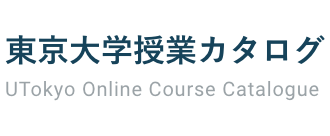過去(2017年度)の授業の情報です
学内のオンライン授業の情報漏洩防止のため,URLやアカウント、教室の記載は削除しております。
最終更新日:2024年4月1日
授業計画や教室は変更となる可能性があるため、必ずUTASで最新の情報を確認して下さい。
UTASにアクセスできない方は、担当教員または部局教務へお問い合わせ下さい。
最終更新日:2024年4月1日
授業計画や教室は変更となる可能性があるため、必ずUTASで最新の情報を確認して下さい。
UTASにアクセスできない方は、担当教員または部局教務へお問い合わせ下さい。
物性化学特論II
機能性低分子と高分子物質の科学(クリスタルとソフトマター)
周期性性をもつ機能性低分子(クリスタル)と非周期の高分子物質(ソフトマター)について、物性化学の魅力を紹介することを目的とする。
The solid state chemistry of functional molecular crystals and polymers are intoduced in order to appeal the fascinating molecular material science.
The solid state chemistry of functional molecular crystals and polymers are intoduced in order to appeal the fascinating molecular material science.
時間割/共通科目コード
コース名
教員
学期
時限
35606-0007
物性化学特論II
柴山 充弘
集中
講義使用言語
英語
単位
1
実務経験のある教員による授業科目
NO
他学部履修
可
開講所属
理学系研究科
授業計画
機能性分子性結晶の物性化学
(森)
1. 分子性導体の発展の歴史―半導体から超伝導体までー
2. 分子性導体の合成と結晶・バンド構造
3. 分子性(超)伝導体、磁性体、分子素子のトピックス
ソフトマターの物性化学
(柴山)
1.中性子
2.散乱とは
3.X線散乱との比較
4.分散系の散乱(孤立散乱)
5.濃厚系の散乱(粒子間干渉効果)
6.高分子系の中性子散乱
7.研究例
Functional molecular crystals(Hatsumi MORI)
1. Development of molecular conductors -from semiconducor to superconductor-
2. Synthesis and crystal and band structures of molecular conductors
3. topics of molecular superconductors, magnets, and electronics
Soft Matter(Mitsuhiro SHIBAYAMA)
1. Neutron,
2. Scattering,
3. Comparison with X-ray scattering,
4. Scattering from dispersed systems,
5. Scattering from condensed systems,
6. Neutron scattering from polymeric systems,
7. Applications.
授業の方法
講義
Lectures
成績評価方法
出席状況および前半と後半でそれぞれ出題されるレポートにより成績評価を行う。
The evaluation is performed based on attendance and the report.
教科書
教科書は使用せず、プリントを配布する。
A textbook is not used but several handouts are distributed.
参考書
“Introduction to Organic Electronic and Optoelectronic Materials and Devices” 2nd ed., H. Mori, Chap. 9 Introduction of Organic Superconducting Materials, CRC Press, Taylor and Francis Group, NY, 2016.
"Polymer Physics", P.G. de Gennes, Cornell Univ. Press., 1979.
その他
開講日など詳細は、以下の化学専攻HPを確認してください。
Please refer to the below link for details about lecture date.
http://www.chem.s.u-tokyo.ac.jp/09master/index.html





 大学院
大学院

 マイリストに追加
マイリストに追加
 マイリストから削除
マイリストから削除



